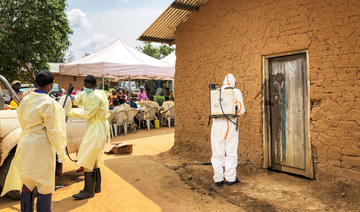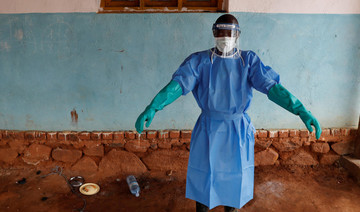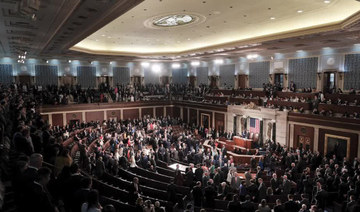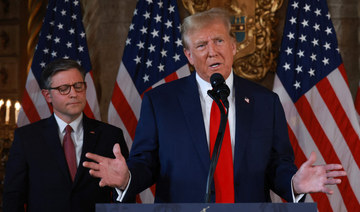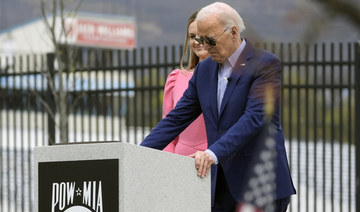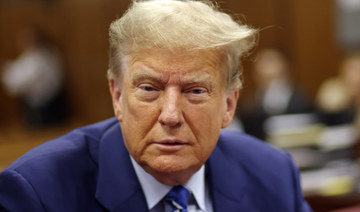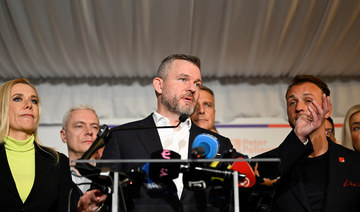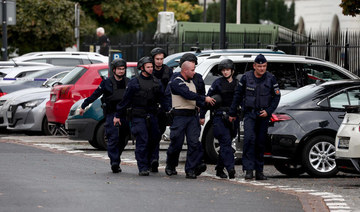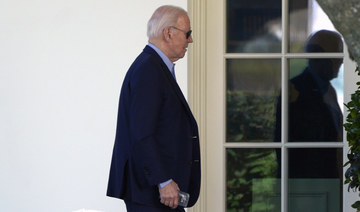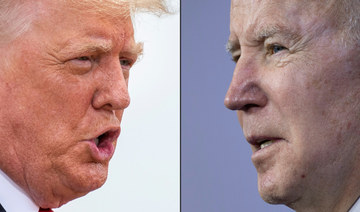Goma, DR Congo: An epidemic of Ebola in eastern DR Congo sharply widened on Wednesday, the eve of the first anniversary of the outbreak, with the announcement of a death in a major city and the quarantining of 15 people in a province that had previously escaped the disease.
A total of 1,803 lives have been lost in the second worst outbreak of Ebola on record, according to figures released Wednesday.
The Democratic Republic of Congo’s pointman on the crisis, Jean-Jacques Muyembe, said a second person had died of Ebola in Goma, a densely-populated city on the border with Rwanda that has transport links to many parts of East Africa.
“A patient who was confirmed with Ebola in Goma has died. Every measure has been taken to block the chain of transmission,” Muyembe told AFP.
Goma is the capital of North Kivu province, which has borne the brunt of the outbreak that began on August 1 2018.
It is a lakeside city of more than two million people that has an airport with flights to the capital Kinshasa, Uganda’s Entebbe and Addis Ababa, the capital of Ethiopia, as well as a port that links to Bukavu and South Kivu province.
Health experts fear outbreaks in major cities, where population density and high mobility make it far harder to isolate patients and trace contacts compared to the countryside.
Aruna Abedi, the chief Ebola coordinator in North Kivu, said the second fatality had arrived at a treatment center “11 days after falling ill.”
“His was really a hopeless case, because the illness was already at an advanced stage and he died overnight Tuesday.”
Abedi urged the public to respond swiftly to symptoms of Ebola and “not hide suspect cases.”
“The treatment center is not a dying room — you have to bring the patient in early,” he said.
The first death in Goma, reported on July 16, sparked a wave of concern.
In that case, a man described as an evangelical preacher had traveled from Goma to Butembo, one of the towns hardest hit by the outbreak.
While there, he preached at seven churches and regularly touched worshippers, including the sick, before returning to Goma.
The day after his announced death, the UN’s World Health Organization (WHO) declared the epidemic a “public health emergency of international concern” — a move designed to step up the global response.
The WHO has since said a shortage in funding was finally being filled after several countries renewed pledges of financial aid.
The World Bank also announced this month it would deploy a further $300 million (269 million euros) in addition to $100 million already provided.
Many people in Goma voiced frustration and despair.
“I’m now afraid that this disease will reach us. We used to hear about it from a distance and now the virus is in our town,” said 27-year-old worker Anuarite Sifa.
“Why hasn’t the Butembo-Goma road been sealed off?” she asked.
Joseph Bakisula, 32, said: “This new death proves that Ebola was already in Goma. May God help us, otherwise it will be catastrophic for us and other towns” connected to Goma.
“The authorities have to take other steps to protect us.”
Meanwhile, in neighboring South Kivu province, which had previously skirted the epidemic, a senior official in Birava said 15 people had been quarantined.
They comprised “a mum and her six children who came from Goma as well as other members of her family who had come to meet them,” said the official, Christian Birhinjira.
Birava is located about 30 kilometers (18 miles) from the Bukavu, the capital of South Kivu.
Among the Democratic Republic of Congo’s neighbors, fears have mounted that the highly contagious virus will cross porous borders.
“Economic and human exchanges are very intense,” the Central African Republic’s health minister, Pierre Somse, warned last week.
“Our livestock farmers sell their cattle in DR Congo. Rebel groups and poachers go back and forth across the border. The risks are high.”
Health Minister Oly Ilunga quit in protest on July 22 after President Felix Tshisekedi took personal control of the Ebola campaign.
One key challenge will be protecting doctors and nurses trying to contain the virus.
Attacks on health workers have had a devastating effect, with seven murdered and more than 50 seriously hurt, according to an unofficial tally.
The epidemic in DR Congo is the deadliest on record after more than 11,000 people were killed in Guinea, Sierra Leone and Liberia between 2014-2016.
DR Congo Ebola epidemic widens on eve of first anniversary
DR Congo Ebola epidemic widens on eve of first anniversary

- The Democratic Republic of Congo’s pointman on the crisis, Jean-Jacques Muyembe, said a second person had died of Ebola in Goma
- Goma is the capital of North Kivu province, which has borne the brunt of the outbreak that began on August 1 2018
EU, US reindustrialization accelerates: study
- Companies in 13 industrial sectors in 11 countries plan to invest $3.4 trillion over the next three years on bringing manufacturing home, Capgemini study found
- COVID-19 pandemic and Russia's brought to the fore the national security aspect of having control over essential supplies and the necessary manufacturing capacity
PARIS: Companies in Europe and the United States are set to plow more money into bringing manufacturing home after the Covid-19 pandemic and Russian invasion of Ukraine disrupted the global economy, a study published Thursday found.
The report by consulting firm Capgemini found that companies in 13 industrial sectors in 11 countries in Europe and the United States plan to invest $3.4 trillion over the next three years on bringing manufacturing home or to a nearby country.
That is up from $2.4 trillion in the past three years.
“The rapidity with which reindustrialization has taken hold is remarkable,” said the report.
“Driving this is the imperative to promote supply chain resilience and flexibility; increase both the availability and appeal of skilled manufacturing jobs; meet climate targets; re-establish national security in strategic sectors, and regain the manufacturing might that the industrial powerhouses of Europe and North America once enjoyed,” it added.
The Covid-19 pandemic severely disrupted global supply chains, making many companies want to regain greater control over raw materials and components.
The Russian invasion of Ukraine brought to the fore the national security aspect of having control over essential supplies and the necessary manufacturing capacity.
“We were surprised by the magnitude of the phenomenon” of relocalization of manufacturing, one of the report’s authors, Etienne Grass, told AFP.
He noted that the investment represents an average allocation of around 8.7 percent of revenue of the companies it surveyed.
“That’s really a considerable” amount, Grass said.
Some 1,300 senior executives of industrial firms with more than a $1 billion in annual revenue were interviewed for the survey in February.
The companies were located in Britain, Denmark, Finland, France, Germany, Italy, the Netherlands, Norway, Spain, Sweden and the United States.
The top reason cited by companies for reindustrialization was to strengthen their supply chains, followed by the importance of establishing a domestic manufacturing infrastructure to ensure national security.
In third place was reducing greenhouse gas emissions, followed by taking advantage of financial incentives to reindustrialize offered by their governments.
While US companies have the largest reinvestment plans in absolute terms at $1.4 trillion, it trails companies in other nations in terms of percentage of gross domestic product, said Grass.
The German reindustrialization effort is equivalent to 20 percent of GDP and the French effort is 13 percent, compared to five percent for the United States despite the generous subsidies offered under the Inflation Reduction Act.
In addition to bringing production back or near home, companies are also reducing their dependence on China by investing in other emerging market nations, the report found.
“To this end, businesses are distributing their critical assets (such as production facilities, warehouses, and logistics centers) across geographies such as India, Southeast Asia, Africa, and Mexico,” it said.
Ukraine, Israel aid package gains Biden’s support as US House Speaker Johnson fights to keep his job
Ukraine, Israel aid package gains Biden’s support as US House Speaker Johnson fights to keep his job
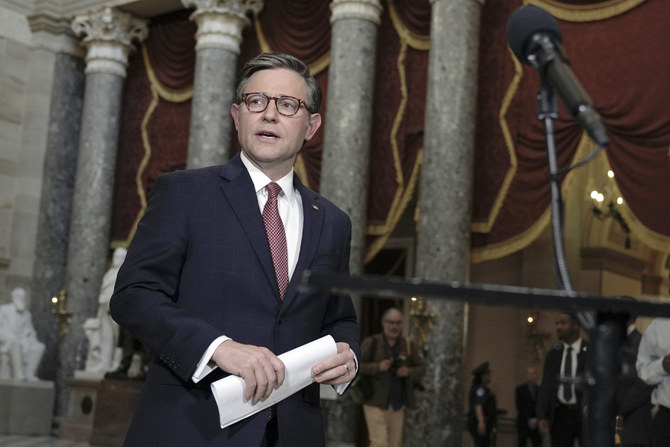
- Aid package to provide $61 billion for Ukraine, $26 billion for Israel and $8 billion to allies in the Indo-Pacific
- Republican hardliners have moved to oust Johnson, but are expected to fail without support from Democrats
WASHINGTON: President Joe Biden said Wednesday he strongly supports a proposal from Republican House Speaker Mike Johnson to provide aid to Ukraine, Israel and Taiwan, sending crucial bipartisan support to the precarious effort to approve $95 billion in funding for the US allies this week.
Before potential weekend voting, Johnson was facing a choice between potentially losing his job and aiding Ukraine. He notified lawmakers earlier Wednesday that he would forge ahead despite growing anger from his right flank. Shortly after Johnson released the aid proposals, the Democratic president offered his emphatic support for the package.
“The House must pass the package this week, and the Senate should quickly follow,” Biden said. “I will sign this into law immediately to send a message to the world: We stand with our friends, and we won’t let Iran or Russia succeed.”
After agonizing for days over how to proceed on the package, Johnson pushed ahead on a plan to hold votes on three funding packages — to provide about $61 billion for Ukraine, $26 billion for Israel and $8 billion to allies in the Indo-Pacific — as well as several other foreign policy proposals in a fourth bill. The plan roughly matches the amounts that the Senate has already approved.
The bulk of the money for Ukraine would go to purchasing weapons and ammunitions from US defense manufacturers. Johnson is also proposing that $9 billion of economic assistance for Kyiv be structured as forgivable loans, along with greater oversight on military aid, but the decision to support Ukraine at all has angered populist conservatives in the House and given new energy to a threat to remove him from the speaker’s office.
Casting himself as a “Reagan Republican,” Johnson told reporters, “Look, history judges us for what we do. This is a critical time right now.”
The votes on the package are expected Saturday evening, Johnson said. But he faces a treacherous path to get there.
The speaker needs Democratic support on the procedural maneuvers to advance his complex plan of holding separate votes on each part of the aid package. Johnson is trying to squeeze the aid through the House’s political divisions on foreign policy by forming unique voting blocs for each issue, then sewing the package back together.
Under the plan, the House would also vote on bill that is a raft of foreign policy proposals. It includes legislation to allow the US to seize frozen Russian central bank assets to rebuild Ukraine; to place sanctions on Iran, Russia, China and criminal organizations that traffic fentanyl; and to potentially ban the video app TikTok if its China-based owner doesn’t sell its stake within a year.
House Democratic Leader Hakeem Jeffries said he planned to gather Democrats for a meeting Thursday morning to discuss the package “as a caucus, as a family, as a team.”
“Our topline commitment is iron-clad,” he told reporters. “We are going to make sure we stand by our democratic allies in Ukraine, in Israel, in the Indo-Pacific and make sure we secure the humanitarian assistance necessary to surge into Gaza and other theaters of war throughout the world.”
The House proposal keeps intact roughly $9 billion in humanitarian aid for civilians in Gaza and other conflict zones. However, progressive Democrats are opposed to providing Israel with money that could be used for its campaign into Gaza that has killed thousands of civilians.
“If they condition the offensive portion of the aid, that would be a conversation, but I can’t vote for more aid to go into Gaza and continue to kill people,” said Rep. Pramila Jayapal, the chair of the Congressional Progressive Caucus.
Meanwhile, the threat to oust Johnson from Rep. Marjorie Taylor Greene, a Republican of Georgia, gained steam this week. One other Republican, Rep. Thomas Massie of Kentucky, said he was joining Greene and called for Johnson to resign. Other GOP lawmakers have openly defied Johnson’s leadership.
“I want someone that will actually pursue a Republican agenda and knows how to walk in the room and negotiate and not get tossed around the room like some kind of party toy,” Greene said. But she added that she would not move on the motion to vacate Johnson as speaker before the vote on foreign aid.
In an effort to satisfy conservatives, Johnson offered to hold a separate vote on a border security bill, but conservatives rejected that as insufficient. Rep. Chip Roy of Texas called the strategy a “complete failure.”
“We’re going to borrow money that we don’t have — not to defend America, but to defend other nations. We’re going to do nothing to secure our border,” said Rep. Bob Good, the chair of the ultraconservative House Freedom Caucus.
With the speaker fighting for his job, his office went into overdrive trumpeting the support rolling in from Republican governors and conservative and religious leaders for keeping Johnson in office.
“Enough is enough,” said Georgia Gov. Brian Kemp on social media. He said “instead of bickering among themselves” the House Republicans should do their “job and vote on the important issues facing our nation.”
At the same time, the speaker’s office was tidying up after Johnson said on Fox News that he and Trump were “100 percent united” on the big agenda items, when in fact the Republican presidential nominee, who had just hosted the House leader in a show of support, opposes much overseas aid as well as a separate national security surveillance bill.
Johnson told CNN on Wednesday that he thought Trump, if elected president, would be “strong enough that he could enter the world stage to broker a peace deal” between Ukraine and Russia.
Yet Johnson’s push to pass the foreign aid comes as alarm grows in Washington at the deteriorating situation in Ukraine. Johnson, delaying an excruciating process, had waited for over two months to bring up the measure since the Senate passed it in February.
“Ukraine is on the verge of collapsing,” said Rep. Michael McCaul, the Republican chair of the House Foreign Affairs Committee.
In a hearing on Wednesday, Pentagon leaders testified that Ukraine and Israel both desperately need military weapons.
“We’re already seeing things on the battlefield begin to shift a bit in Russia’s favor,” said Defense Secretary Lloyd Austin.
The House’s version of the aid bill pushes the Biden administration to provide long-range ATACMS (Army Tactical Missile Systems) to Ukraine, which could be used to target Russian supply lines.
The US has resisted sending those weapons out of concerns Moscow would consider them escalatory, since they could reach deeper into Russia and Russian-held territory. The House legislation would also allow the president to decline to send the ATACMS if it is against national security interests, but Congress would have to be notified.
Still, there was acknowledgement in Washington that Johnson could soon be out as speaker — a job he has held less than five months since Rep. Kevin McCarthy was ousted from the office.
Rep. Don Bacon, a Nebraska Republican, said this week that if Johnson is ousted, he would “be known in history as the man who did the right thing even though it cost him a job.”
Poland’s president becomes the latest leader to visit Donald Trump as allies eye a possible return
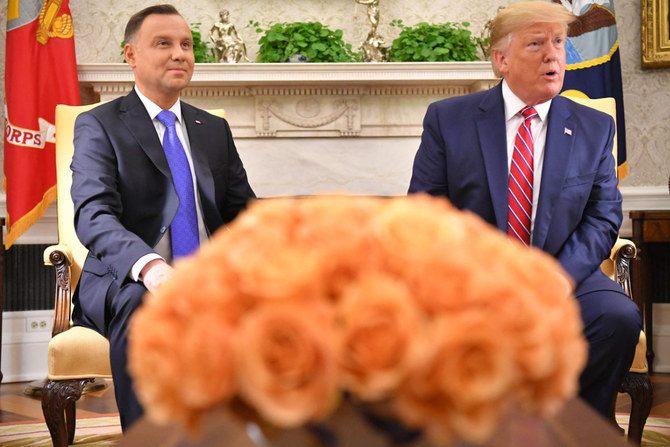
- Andrzej Duda, who has long expressed admiration for Trump, is also a staunch supporter of Ukraine in its war against Russia
- He has encouraged the US to provide more aid to Kyiv. That funding has been held up by Trump allies in Congress
NEW YORK: Former President Donald Trump met Wednesday in New York with Polish President Andrzej Duda, the latest in a series of meetings with foreign leaders as Europe braces for the possibility of a second Trump term.
The presumptive Republican nominee hosted Duda for dinner at Trump Tower, where the two were expected to discuss Ukraine, among other topics. Duda, who has long expressed admiration for Trump, is also a staunch supporter of Ukraine and has encouraged Washington to provide more aid to Kyiv amid Russian’s ongoing invasion. That funding has been held up by Trump allies in Congress.
As he arrived, Trump praised the Polish president, saying, “He’s done a fantastic job and he’s my friend.”
“We had four great years together,” Trump added. “We’re behind Poland all the way.”
US allies across the world were caught off guard by Trump’s surprise 2016 win, forcing them to scramble to build relationships with a president who often attacked longstanding treaties and alliances they valued. Setting up meetings with him during the 2024 campaign suggests they don’t want to be behind again.
Even as he goes on trial for one of the four criminal indictments against him, Trump and Democratic President Joe Biden are locked in a rematch that most observers expect will be exceedingly close in November.
“The polls are close,” said Sen. Chris Murphy, D-Connecticut, a Biden ally and a major voice in his party on foreign affairs. “If I were a foreign leader — and there’s a precedent attached to meeting with candidates who are nominated or on the path to being nominated — I’d probably do it too.”
Murphy noted that former President Barack Obama did a lengthy international tour and met with foreign leaders when he first ran for the White House. So did Mitt Romney, the former Massachusetts governor, who challenged Obama in 2012 and whose trip included a stop in Poland’s capital, Warsaw.
Duda’s visit comes a week after Trump met with British Foreign Secretary David Cameron, another NATO member and key proponent of supporting Ukraine, at the former president’s Florida estate.
And last month, Trump hosted Hungarian Prime Minister Viktor Orbán, an autocrat who has maintained the closest relationship with Russia among European Union countries. Orban shared a montage of footage of the visit on his Instagram feed, with included an image of him and his staff meeting with Trump and the former president’s aides in a scene that looked like an official bilateral meeting.
Trump also met briefly in February with Javier Milei, the fiery, right-wing populist president of Argentina who ran a campaign inspired by Trump, complete with red “Make Argentina Great Again” hats. Milei gave Trump an excited hug backstage at the annual Conservative Political Action Conference outside Washington, according to video posted by a Trump campaign aide.
Biden administration officials have been careful not to weigh in publicly on foreign leaders’ meetings with Trump, who they acknowledge has a real chance of winning the race.
While some officials have privately expressed frustration with such meetings, they are mindful that any criticism would open the US to charges of hypocrisy because senior American officials, including Secretary of State Antony Blinken, meet frequently with foreign opposition figures at various forums in the United States and abroad.
Security and policy officials monitor the travel plans of foreign officials visiting the US, but generally don’t have a say in where they go or with whom they meet, according to an administration official who spoke on the condition of anonymity to discuss protocol.
Trump has been back in his hometown this week for the start of his criminal hush money trial, which has dramatically limited his ability to travel and campaign. While in town, aides have been planning a series of events that began Tuesday night when Trump, after court adjourned, stopped by a Harlem bodega where a man was killed to rail against crime and blast the district attorney who made him the first former president in US history to stand criminal trial.
Duda, a right-wing populist who once proposed naming a military base in his country “Fort Trump,” described the dinner earlier Wednesday as a private get-together between friends at Trump’s former residence while he is in town for meetings at the United Nations.
“I have been invited by Mr. Donald Trump to his private apartment,” Duda told reporters, saying it was “a normal practice when one country has good relations with another country” to want those relations to be as strong as “possible with the representatives of various sides of the political stage.”
He described a friendly relationship with Trump built over years of working together.
“We know each other as people. Like two, I can say in some way, friends,” said Duda, whose term ends in 2025.
Duda’s visit comes as House Republicans wrangle over a $95 billion foreign aid bill that would provide new funding to Ukraine, including money for the US military to replace depleting weapon supplies.
Many Trump allies in the House are fiercely opposed to aiding Ukraine, even as the country warns that it is struggling amid a fresh Russian offensive. Trump has said he might be open to aid in the form of a loan.
Like Cameron, Duda’s efforts to push the US to approve additional aid put him in common cause with Biden, who has struggled for six months to unlock additional congressional funding.
One area where Trump and Duda agree when it comes to the conflict are their efforts to push NATO members to increase their defense spending. Duda has called on fellow members of the alliance to raise their spending to 3 percent of gross domestic product as Russia continues its invasion of Ukraine. That would represent a significant increase from the current commitment of 2 percent by 2024.
Trump, in a stunning break from past US precedent, has long been critical of the Western alliance and has threatened not to defend member nations that do not hit that spending goal. That threat strikes at the heart of the alliance’s Article 5, which states that any attack against one NATO member will be considered an attack against all.
In February, Trump went even further, recounting that he’d once told leaders that he would “encourage” Russia to “do whatever the hell they want” to members that are — in his words — “delinquent.”
Duda suggested he intended to raise his proposal at the dinner.
“I have never talked with President Donald Trump about my proposal of raising the spending on defense of NATO countries from 2 percent to 3 percent of GDP, but I think that his approach to it will be positive,” he said.
The visit was met with mixed reaction in Poland, where fears of Russia run high and Duda’s friendly relationship with Trump has been a source of controversy.
Poland’s centrist Prime Minister Donald Tusk, a political opponent of Duda, was critical of the dinner but expressed hope that Duda would use it as an opportunity “to raise the issue of clearly siding with the Western world, democracy and Europe in this Ukrainian-Russian conflict.”
Duda, for his part, said he wasn’t worried since presidents regularly meet with various politicians during foreign trips.
“No, I am not worried because presidents meet with their colleagues, especially with those who had held presidential offices in their respective countries,” he said. “This is regular practice, there is nothing extraordinary here.”
Thousands protest in Georgia as parliament votes on so-called ‘Russian law’ targeting media
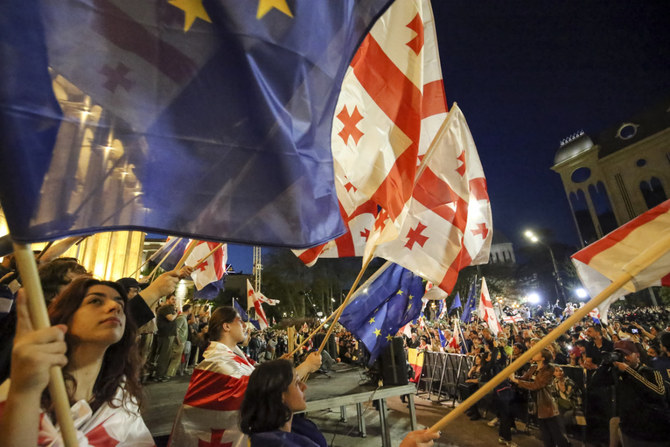
- Protesters denounce it as “the Russian law” because Moscow uses similar legislation to stigmatize independent news media
- Opponents say the proposal would obstruct Georgia’s long-sought prospects of joining the European Union
TBILISI, Georgia: Georgia’s parliament has voted in the first reading to approve a proposed law that would require media and non-commercial organizations to register as being under foreign influence if they receive more than 20 percent of their funding from abroad.
Thousands gathered outside parliament to protest. Opponents say the proposal would obstruct Georgia’s long-sought prospects of joining the European Union. They denounce it as “the Russian law” because Moscow uses similar legislation to stigmatize independent news media and organizations seen as being at odds with the Kremlin.
“If it is adopted, it will bring Georgia in line with Russia, Kazakhstan and Belarus and those countries where human rights are trampled. It will destroy Georgia’s European path,” said Giorgi Rukhadze, founder of the Georgian Strategic Analysis Center.
In an online statement Wednesday, EU foreign policy chief Josep Borrell described the parliament’s move as “a very concerning development” and warned that “the final adoption of this legislation would negatively impact Georgia’s progress on its EU path.”
“This law is not in line with EU core norms and values,” Borrell said.
Borrell said that “Georgia has a vibrant civil society” that is a key part of its EU membership quest.
“The proposed legislation would limit the capacity of civil society and media organizations to operate freely, could limit freedom of expression and unfairly stigmatize organizations that deliver benefits to the citizens of Georgia,” he added.
Although Georgian President Salome Zourabichvili would veto the law if it is passed by parliament in the third reading, the ruling party can override the veto by collecting 76 votes. Then the parliament speaker can sign it into law.
The bill is nearly identical to a proposal that the governing party was pressured to withdraw last year after large street protests. Police in the capital, Tbilisi, used tear gas Tuesday to break up a large demonstration outside the parliament.
Wednesday had an even larger rally. Speaking there, opposition parliament member Aleksandre Ellisashvili denounced lawmakers who voted for the bill as “traitors” and said the rest of Georgia will show them that “people are power, and not the traitor government.”
The only change in wording from the previous draft law says non-commercial organizations and news media that receive 20 percent or more of their funding from overseas would have to register as “pursuing the interests of a foreign power.” The previous draft law said “agents of foreign influence.”
Zaza Bibilashvili with the civil society group Chavchavadze Center called the vote on the law an “existential choice.”
He suggested it would create an Iron Curtain between Georgia and the EU, calling it a way to keep Georgia “in the Russian sphere of influence and away from Europe.”
freedom of expression and unfairly stigmatize organizations that deliver benefits to the citizens of Georgia,” he added.
Biden is off on details of his uncle’s WWII death as he calls Trump unfit to lead the military
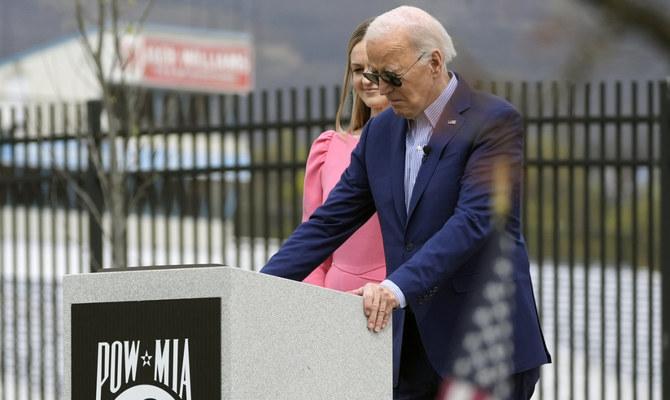
- The US government’s record of missing service members does not attribute Finnegan’s death to hostile action or indicate cannibals were any factor
WASHINGTON: President Joe Biden on Wednesday misstated key details about his uncle’s death in World War II as he honored the man’s wartime service and said Donald Trump was unworthy of serving as commander in chief.
While in Pittsburgh, Biden spoke about his uncle, 2nd Lt. Ambrose J. Finnegan Jr., aiming to draw a contrast with reports that Trump, while president, had called fallen service members “suckers” and “losers.”
Finnegan, the brother of Biden’s mother, “got shot down in New Guinea,” Biden said. The president said Finnegan’s body was never recovered and “there used to be a lot of cannibals” in the area. Biden, who also relayed a version of the story earlier in the day after stopping by the memorial in Scranton, was off on the particulars.
The US government’s record of missing service members does not attribute Finnegan’s death to hostile action or indicate cannibals were any factor.
“We have a tradition in my family my grandfather started,” said Biden, a toddler at the time of his uncle’s death in 1944. “When you visit a gravesite of a family member — it’s going to sound strange to you — but you say three Hail Marys. And that’s what I was doing at the site.”
Referring to Trump, the presumptive GOP presidential nominee, Biden said, “That man doesn’t deserve to have been the commander in chief for my son, my uncle.”
Biden’s elder son, Beau, died in 2015 of brain cancer, which the president has stated he believes was linked to his son’s yearlong deployment in Iraq, where the military used burn pits to dispose of waste.
Some former Trump officials have claimed the then-president disparaged fallen service members as “suckers” and “losers” when, they said, he did not want to travel in 2018 to a cemetery for American war dead in France. Trump denied the allegation, saying, “What animal would say such a thing?”
According to the Pentagon’s Defense POW/MIA Accounting Agency, Biden’s uncle, known by the family as “Bosie,” died on May 14, 1944, while a passenger on an Army Air Forces plane that, “for unknown reasons,” was forced to ditch in the Pacific Ocean off the northern coast of New Guinea. “Both engines failed at low altitude, and the aircraft’s nose hit the water hard,” the agency states in its listing of Finnegan. “Three men failed to emerge from the sinking wreck and were lost in the crash.”
The agency said Finnegan was a passenger on the plane when it was lost. “He has not been associated with any remains recovered from the area after the war and is still unaccounted-for,” according to the agency.
White House spokesman Andrew Bates did not address the discrepancy between the agency’s records and Biden’s account when he issued a statement on the matter.
“President Biden is proud of his uncle’s service in uniform,” Bates said, adding Finnegan ”lost his life when the military aircraft he was on crashed in the Pacific after taking off near New Guinea.”
Biden “highlighted his uncle’s story as he made the case for honoring our ‘sacred commitment ... to equip those we send to war and take care of them and their families when they come home,’ and as he reiterated that the last thing American veterans are is ‘suckers’ or ‘losers.’”
The Democratic president also misstated when uncles enlisted in the military, saying they joined “when D-Day occurred, the next day,” in June 1944, when they actually joined weeks after the Dec. 7, 1941, attack on Pearl Harbor.
After Finnegan’s death, a local newspaper published a telegram from Gen. Douglas MacArthur expressing condolences to Finnegan’s family:
“Dear Mr. Finnegan: In the death of your son, Second Lt. Ambrose J. Finnegan Jr., while in service of his country, you have my profound sympathy. Your consolation may be that he died in the uniform of our beloved country, serving in a crusade from which a better world for all will come. Very faithfully, Douglas MacArthur.”
Biden, in his 2008 book “Promises to Keep,” made only brief mention of his uncle, describing him as flyer who was killed in New Guinea.



